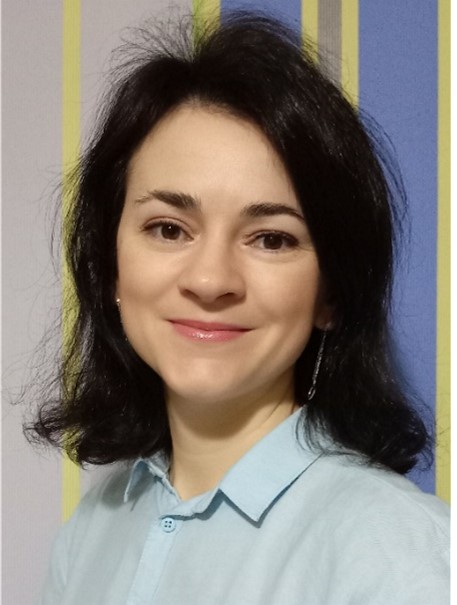Two years after the full-scale Russian invasion of Ukraine, Yana Dragovenko, project manager at DVV International Ukraine, talks about the situation in her country and the role of adult learning and education in times of war.
Ms Dragovenko, how are you experiencing the war in your country and how are you dealing with this difficult situation?
I now live with my family in Pryluky, in the Chernigiv region. I feel safer here with my 5-year-old son than where we lived before in Kyiv, which is a strategic target of constant, massive russian missile and drone attacks. It is extremely sad and painful to me that the lives of millions of Ukrainians are being destroyed, tens of thousands of Ukrainians are dying, and entire cities and villages are in ruins. Ukrainians are paying a very high price for their freedom, as well as for the freedom of the democratic world. This war is not only between Ukraine and Russia; it is a war between worlds – between humanity and brutality, democracy and totalitarianism, between respect for human rights and a complete disregard for them. My cousin died defending our country. Many relatives and friends are in the army now. My faith, family, and people close to me in spirit help me cope with the reality of war.
It’s been two years since the full-scale Russian invasion of Ukraine. What has this meant for the adult learning and education sector?
There are nearly 4.9 million internally displaced persons in Ukraine, and 6.2 million are refugees. People and human capital are the greatest value in Ukraine now. This leads to massive demand for adult learning and education: we need personal, social, and professional competencies to rebuild the lives of millions of people, and vocational and technical competencies to restore the destroyed infrastructure.
How can ALE support the Ukrainian people in these difficult times? How have ALE providers adapted their offers to meet these needs?
During the war, ALE institutions have become a place of strength, consolidation, and cooperation of efforts in local communities. This is evidenced by many social and volunteer initiatives which were founded in ALE institutions. For example, there have been charity events to support the Ukrainian Armed Forces, tailoring of clothes, first-aid kits for the army, procurement and distribution of food, etc. Many courses have been adapted from offline to online, or offered in a mixed format. New course topics have appeared – pre-medical care and tactical medicine, various courses in mental health (art therapy, psychological support groups, overcoming fear), courses on nutrition in conditions of stress and crises. Ukrainian language, history, and culture courses are quite popular.
You are in charge of DVV International’s project “Reintegration of War Veterans through the Creation of Educational Opportunities,” which is financed by the German Federal Foreign Office. Why did you choose war veterans as a target group? Can you tell us a little bit about their situation?
According to the forecast of the Ministry of Veteran Affairs of Ukraine, after the war's end, the number of veterans in Ukrainian society may increase to 5 million. Veterans, as well as their families, face various challenges in their transition to civilian life: problems with physical and mental health, the need for legal support, and problems with employment. Very often, people with combat experience returning to their communities tend to alter their life values and rethink what is important in life. This often leads to a change in the professional path and the choice of a new profession. According to the 2023 survey of the Ukrainian Veterans Fund, 24.4% of the respondents among veterans have a need for education, 20.4% have a need for employment, and 63.6% declared a desire for entrepreneurship. Therefore, ALE can become a powerful tool for acquiring new professional skills, mastering a new profession, or starting a business.
What are the main objectives of the project?
The project is aimed at reintegration of war veterans and their families into civilian life by increasing their professional knowledge, skills, and competitiveness in the labour market. There are three directions:
- Establishing regular counselling, orientation, and career guidance services in 7 ALE institutions for at least 2100 veterans and their family members;
- Imparting new knowledge and skills to improve competitiveness in the labour market and their reintegration into civilian life;
- Support for the establishment of small businesses by veterans.
Much attention is paid to studying the needs of veterans and involving them in the implementation process. For instance, veterans and family members serve on the teams of the local ALE institutions as local coordinators and veterans’ assistants in Vinnytsia, Mykolaiv, Nikopol, Poltava. Regular cooperation is established with leading expert veteran organisations.
In your opinion, what role(s) can ALE play in post-times of war?
First, ALE can strengthen the unity of the Ukrainian society. Tolerance and respect for different experiences, non-violent communication, and establishing dialogue between different groups are extremely relevant. Second, we must be prepared to live in a society with a large number of people with disabilities. This means we must create a barrier-free environment regarding infrastructure and various spheres of life – economic, social, and educational. Another critical topic is sexuality education for veterans with disabilities, which remains taboo and closed in Ukraine. Third, we will need vocational training and labor professions for qualified restoration of destroyed infrastructure. To summarise, we are all experiencing war. This experience is different and unique for each person, and often traumatic. However, trauma can lead to post-traumatic stress disorder or post-traumatic growth. I believe that ALE is precisely the transformative tool to turn the war experience into a fulcrum for our growth in the future.



